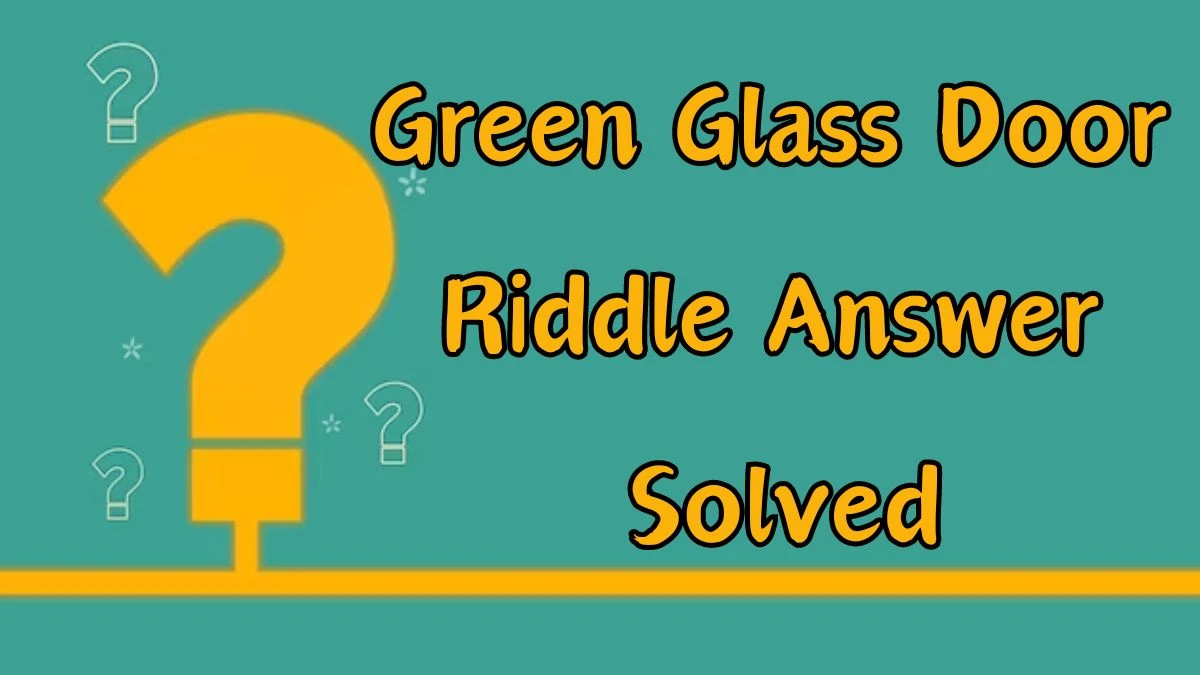- Rojgarlive »
- Riddle »
- Green Glass Door Riddle Answer Solved
Green Glass Door Riddle Answer Solved
by Preethi
Updated Feb 02, 2024

"Green Glass Door" Riddle
The "Green Glass Door" riddle is a word-based puzzle where the challenge is to figure out a pattern governing what can pass through a hypothetical "Green Glass Door". The riddle involves presenting pairs of items, such as "a sparrow can go through but a pigeon cannot" or "a boot can go through but not a shoe." The trick lies in identifying the underlying pattern.
Contrary to the natural inclination to compare the objects themselves, the solution hinges on recognizing a common feature in the words used to describe them. The hint lies in the name of the riddle itself: ""Green Glass Door"." The key is that words with double letters, like in "green," "glass," and "door," are the ones that can go through the door, while words without double letters cannot.
"Green Glass Door" Riddle Answer
To solve the "Green Glass Door" riddle, one must keenly observe the words "green," "glass," and "door," recognizing that they all contain double letters. This realization serves as the foundation for understanding the pattern. The trick is that items described with words containing double letters can pass through the hypothetical door, while those without double letters cannot.
For instance, a rabbit can go through because it has double Bs, and a boot is acceptable due to its double Os. On the other hand, items like shoes, postcards, and hares cannot pass through because they lack double letters. The riddle challenges our thought process by directing attention to linguistic patterns rather than the physical attributes of the objects involved.
"Green Glass Door" Riddle Answer: Double Letters
What is Riddle?
A riddle is like a puzzle wrapped in words, where a statement or question has a sneaky, hidden meaning that you need to uncover. There are two main types: enigmas, which are tricky problems expressed in fancy language, demanding you to think cleverly for the solution, and conundra, which involve playing with words in either the question or the answer. It's like a little linguistic game that challenges your brain.
Imagine it as a universal art form, found in cultures worldwide, each crafting their unique puzzles. Riddles, unlike myths that establish social norms, enjoy teasing the boundaries of ideas, showing that things aren't as straightforward as they seem. They playfully dance with concepts, making us think deeper and, in the end, affirming the importance of those boundaries.
How to Solve a Riddle?
Read Carefully:
Begin by thoroughly reading the riddle. Pay close attention to every word and detail. Sometimes, the solution lies in subtle nuances.
Identify Key Elements:
Identify the key elements or clues in the riddle. Look for words or phrases that might have double meanings or stand out as essential to solving the puzzle.
Think Creatively:
Riddles often require creative thinking. Consider different interpretations of the words and phrases presented. Don't limit yourself to the most obvious meanings.
Consider Wordplay:
Many riddles involve wordplay, such as puns or homophones. Explore whether any words have dual meanings or sound similar to other words that could provide a clue.
Look for Patterns:
Some riddles follow specific patterns or have a consistent theme. If you notice a recurring element or structure, it could be a clue to the solution.
Use Context:
Consider the context of the riddle. Sometimes, understanding the context or background information can lead you to the correct answer.
Test Hypotheses:
Once you have a potential solution in mind, test it against the clues provided in the riddle. Does it fit all the criteria? If not, reassess and try a different approach.
Collaborate:
If you're stumped, discussing the riddle with others can provide new perspectives. Group brainstorming can lead to breakthroughs and shared insights.
Patience is Key:
Solving riddles may take time. Be patient and don't get discouraged. Sometimes, stepping away and returning with fresh eyes can make a difference.
Learn from Solutions:
Whether you solve the riddle or not, take note of the solution. Understanding how the puzzle was crafted can enhance your riddle-solving skills for future challenges.
Riddle Solving Benefits
Thinking Skills:
Solving riddles helps your brain think better. It makes you look at things in different ways and figure out tricky problems.
Problem-Solving:
Riddles are like puzzles. They make you find solutions to challenges, teaching you how to think and solve problems smartly.
Being Creative:
Riddles are like little games for your imagination. They make you think creatively, which is helpful not just in fun stuff but also in subjects like math and science.
Remembering Things:
When you solve riddles, you need to remember details. This helps improve your memory, making it easier for you to remember things in school or in everyday life.
Working Together:
Some riddles are better solved with friends. Figuring them out together helps you work as a team, making you good at working with others.
Feeling Proud:
When you solve a tricky riddle, it feels like you achieved something cool. It boosts your confidence and makes you feel proud of yourself.
Learning New Words:
Riddles introduce you to new words. It's like a fun way to learn and use words you might not have known before.
Green Glass Door Riddle Answer Solved - FAQs
A riddle is a puzzling statement or question designed to challenge one's thinking, often with a hidden meaning or answer.
Riddles enhance critical thinking, problem-solving, creativity, memory, and teamwork skills in a fun and engaging way for children.
In this riddle, only words with double letters can pass through the imaginary green glass door, creating a pattern to solve the puzzle.
Solving riddles exercises the brain, promoting improved cognitive functions, creative thinking, and the ability to analyze information.
Platforms like Smile and Learn offer a variety of educational riddles, fostering skills in mathematics, logic, and language for young minds.




